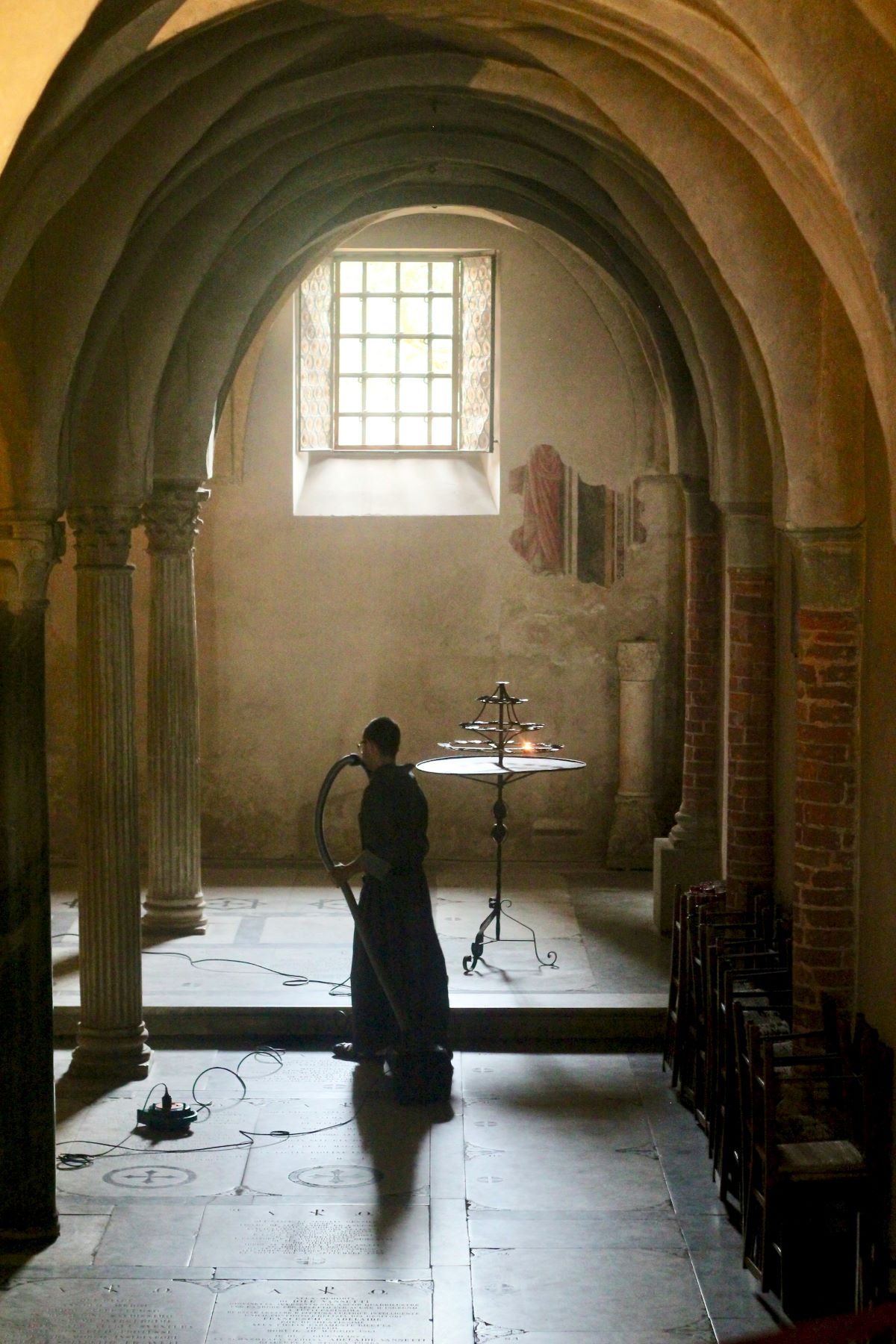Ora et Labora, Prayer and Work

“Whatever good work thou dost begin, beg of Him with most earnest prayer to perfect” (Rule of St. Benedict, preface, p. 3, 5).
I was in a Catholic bookstore several decades back when a man pointed to the book of St. Benedict’s rules and said to me, “This is how every home should be run”. Intrigued, I bought the book.
Back then we didn’t hear about our home being the domestic church, but the saints do teach us to turn our heart and mind to God as we go through the day. A life which melds prayer and work sounds inviting, even dreamy! Then the reality of the daily grind sets in, and it seems like everyone needs a ‘piece’ of you, leaving little-to-nothing of your heart to give to God.
Yet there is much wisdom that can be extracted from St. Benedict’s little book. His advice for Abbotts is apropos for dads (abbott) and moms (abbess) (Chapter 2). He teaches us to love our family members without preferring one over the other, keeping in mind the responsibility held in caring for their souls. To “bear equal love to all” (p. 27) can be difficult because we all have our personality differences. Sadly, sometimes the manner in which discipline is kept in the home can leave a child feeling least loved. It can devolve into a parent demanding obedience from the child. In Chapter 5, St. Benedict teaches us that we must place obedience to God and his teachings first. That should shape our obedience to those whom He places over us in life, those responsible for us in various ways (such as a parent, husband, boss, pastor, teacher, etc.). Our obedience is to be given with good will because it is our gift to God and “God loves a cheerful giver” (p. 49). How we live obedience will become the model for our children.
Love is sacrifice and obedience is the foundation of humility. Fortunately, St. Benedict also provides clear instruction on humility (Chapter 7). Rhonda Ortiz gave her ways of developing a Benedictine-style routine within the daily grind: “I soon learned what St. Benedict knew: time can be sanctified. Prayer not only marks the hours of the Benedictine day, but transforms it.” And although she didn’t speak to this, her suggestions of incorporating night prayers into her baby’s feeding routine does carry the spirit of adaptation Benedict expresses in his discourses on night prayers.
But we can’t do any of this by our own strength. Grace is needed, and to be receptive to grace we must set aside a quiet time for ourselves to be in the silence with God. Unfortunately, when ‘spare’ moments arise, a welcomed break, it is too tempting to use those moments to indulge in social media or snacks. In Chapter 6, St. Benedict encourages us to embrace the gift and benefits of silence. Margaret Rose Realy, Obl. OSB wrote beautifully of this silence in her article, Following Solitude as well as on balancing action with contemplation in Dormancy and Vibrancy.

Also important to schedule into the day is ‘communal’ or family prayer. When praying with your kids, don’t fret that you are acting irreverently if the whole rosary isn’t completed! Building upon the notion of speech that is purposeful and limited, Benedict advises “Our prayer, therefore, ought to be short and pure, unless perchance it be prolonged by the inspiration of Divine Grace…let all prayer made in common be short” (p. 115). One heartfelt Hail Mary can be more powerful than battling through five decades of them with kids rolling around the floor like a herd of feral cats!
Finally, religious communities end their day with the ‘grand silence’, a time when talking ends and members quietly bring their day to a close (Chapter 42). In the home, this would begin with turning off the television and computer, silencing the phone, and speaking in softer tones. It provides a transition from the busyness of the day to a time of rest, and an opportunity to teach children silent prayer sitting before a crucifix or picture of Jesus, talking quietly with Him about the highs and lows of their day. Mommies and daddies can do this too. 😊
St. Benedict’s little way actually has a lot to say to us today. Each moment of the day we are living Divine providence. Transforming our work into prayer helps us to live it consciously. All for the greater glory of God!
——————–
Quotes from St. Benedict’s Rule are taken from The Rule of Our Most Holy Father St. Benedict, Patriarch of Monks, from the Old English Edition of 1638. (London: Washbourne, 1875) https://www.saintsbooks.net/books/St.%20Benedict%20-%20The%20Rule%20of%20-%20Latin%20and%20English%20Edition.pdf
(Images: monk cleaning by David Tip, pillow fight by Allen Taylor, both from Pexels)

Thank you for caring and sharing appropriately...
Consecrated to the Sacred Heart of Jesus through the Immaculate Heart of Mary. Except where noted, all design, writing and images ©2024 by Debra Black and TheFaceofGraceProject.com. All Rights Reserved. No part of this website may be reproduced, distributed or transmitted in any form or by any means, including downloading, photocopying, recording, or other electronic or mechanical methods, without the prior written permission of the publisher, except in the case of brief quotations embodied in critical reviews and certain other noncommercial uses permitted by copyright law. For permission or to report violations please email: thefaceofgraceproject@gmail.com
